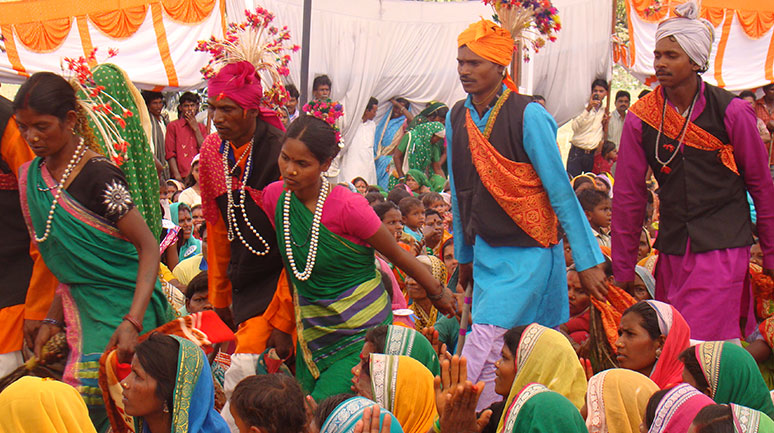Changes through Participatory Theatre


ONE EVENING, DURGAPRASAD, A CONTRACTOR from Mohgaon, came to visit Kumharra village to discuss matters with the sarpanch of the village. As he entered the village, he heard a voice resounding in the village: “Bhaat baad mein khabo, natak dekhan jabo (Have your food later, come to see the play)”; “Aao aao natak dekho…natak dekho…bin paise ka natak dekho (Come, come to watch the play…watch the play….watch.
P uzzled, he approached the sarpanch’s house. As he interacted with the man, the calls outside became louder. His curiosity got the better of him and he stopped his conversation with the sarpanch mid-way and went out to see what was happening.
Durgaprasad followed the sound and came to a well-lit verandah of the panchayat office, which was filled by community members. Seeing such a large gathering of people at such an odd time surprised Durgaprasad. Durgaprasad was stunned by what he saw. For the first time, he was witnessing a street natak (play), which engaged with the spectators and required their participation to take the play to its conclusion. The actors were not talking down to the spectators; instead, there was a dialogue with the spectators, to generate critical thinking.
Durgaprasad was stunned by what he saw. For the first time, he was witnessing a street natak (play), which engaged with the spectators and required their participation to take the play to its conclusion. The actors were not talking down to the spectators; instead, there was a dialogue with the spectators, to generate critical thinking
He approached one of the community members to inquire about the gathering.
“Saheb, natak dekhan aayen ne, (We’ve come to watch a play, Sir)” was the response.
His conversation was interrupted with someone calling out, “Jai Sewa, Ram Ram, Sita Ram” and the crowd of people reciprocating in similar manner.
Durgaprasad saw a young person asking the crowd, “Kya aap natak dekhan chahabo? (Do you want to watch a play?)” With this began a dialogue between him and the members of the community. A group of performers then acted out a situation where a husband abandons his wife and brings home a new partner. The performers highlighted the plight of the women and asked the community members whether or not such a situation was acceptable; and whether anyone from the community would be willing to change the situation. The community members proclaimed that the situation was, indeed, not acceptable because this was unjust for the woman (being abandoned by her husband). Some of the community members approached the stage and confronted the husband (the Oppressor).
Neeraj Joshi is an Executive in PRADAN. He is based in Mohgaon block, Mandla district, Madhya Pradesh.

